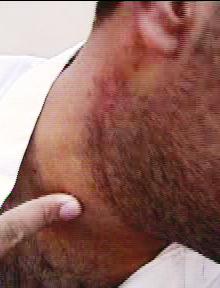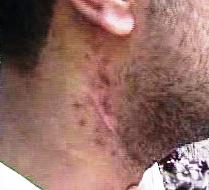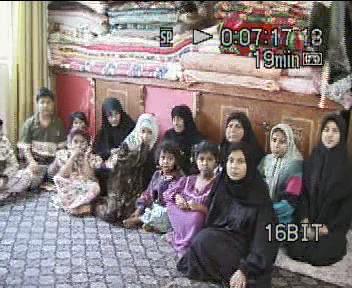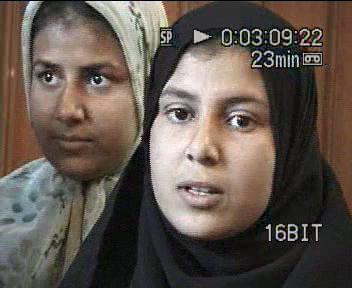Untitled Document
April 14, 2005
Tarmiya is a small town about 60 kilometers north of Baghdad, on the west bank of the Tigres, well known for its beautiful landscapes, peaceful and hospitable people, and the Karkh water project which supplies Baghdad with drinking water. For the last two years it was rarely in the news. But a horrible story of three young men slaughtered took us there.
Four American check points, with tens of soldiers, tanks and armored vehicles, very detailed search of cars and people, a totally damaged high school of industry, a graveyard of agricultural vehicles, and the whole tense atmosphere on the way , say that Tarmiya is no longer the peaceful town we know. Inside the town, however, there were no American soldiers that day. The police station was a military fortress, covered with bullet shots, surrounded with sand bags and barbed wires. No police men to be seen. No glass on the windows, only sand bags. On the walls writings glorify the resistance and condemn spies.
Tarmiya is no more than just one main street, with many side roads, and one central market place, and of course the water project complex.
We have nothing to be afraid of
N, the man we went all the way from Baghdad to see, refused to talk to us, and for good reason. His life is at risk. But he found it too cruel to send us away. "God is the protector" he said, deciding to tell us his story.
N is in his mid twenties, a father of two children. He is a worker in a poultry farm. There was a deep wound on his neck from ear to ear, with stitches on both sides.
_" what happened to your neck?" I asked.
One afternoon, two months ago, he had to hurry back to work after some gusts delayed him at home. When he reached the farm, his friend B. who was eating his lunch, asked:" why did you come, the American are every where surrounding the orchards?"

"I did not see any" N replied, "but any way we have nothing to be afraid of, they can come, ask, search, whatever, we have nothing to hide". N went out to see. The armored vehicles were surrounding the farm. When they saw him, they pointed the guns towards him. He did not move. He knew that any movement could get him killed. There were more than ten foot soldiers too.
"They ordered us to put our hands up. We did. They ordered us to go inside the farm. 6 of them came in, all in black eye glasses, very well built. One was rather tall and fat, took off his glasses and threw them in my face. I did not move, did not put my hands down. I heard them searching the farm, breaking things. One of them who was holding a big machine gun(Iraqis call it a PKT), asked if there were any weapons? I said no. He went in and came back again, and again asked where are the weapons, I told him we have no weapons. He hit me by the gun end on my left cheek, then opened my mouth and put the gun in it. Then he began hitting me on my chest, saying there are weapons in the farm. I told him he can take the chickens out and search the place. He became mad and hit me again very strongly. Then he pulled me very near to his face, and kept looking in my eyes. I looked in his. After a long while, he smiled and shook his head.
"You are good and strong" he said. You are the one who put the blasting package on the way"
"No, I am just a worker here" I replied.
From Ear to Ear
They were taking a shooting position all the time. Now, they pulled back and said bye, bye, taking out their bayonets and rubbing them on their hands. The group leader went to the vehicle and came back and told the others to bring us.

B. was a head of me, and the gun was in my back. A soldier said Ali Baba, I said no. They took us inside the orchard, they were looking for something. I realized later that they were looking for a dark and hidden place. The thicket was perfect with the vinery and the banana trees. They made us sit with our backs to each other. The group leader stood beside me, and the fat one beside B. He fixed my hands back on the ground by his boot. All the others took a shooting position. He caught my neck. I realized that they are going to kill us. With one hand he pulled back my head clutching my hair. I saw the bayonet in the other hand going down on my neck. He put it here".
N. pointed to his left ear. "He pulled it to here, slaughtering me" N. passed his finger around his neck to his right ear. "I turned right, put my hand on the wound, it went in the opening. I could touch my throat. I felt the blood going through my fingers on my chest. I saw B. he was slaughtered too. The fat one put his bayonet in B.'s throat and cut it, and then he put his boot on B.'s neck and pulled back his head breaking his neck. B. was dead.
The other one kicked me, threw me to the ground and put his boot on my neck. The arteries were cut and dropping. His boot went into the open wound. He began pushing very hard. The other one, who killed B., came and stood over me. They were both over me, and then he stabbed me here" N. pointed to his back, on the right. There was a trace of a deep wound.
"I was lying on my back, I saw them dragging B. and throwing him in the stream, then they dragged me, threw me, and kicked me. I lied flat on B.'s body"
After a while they left, I decided to leave the stream because I wanted people to know about us. The stream is now red. I thought that I was dying soon. I felt I had to tell somebody about what happened. It was getting dark soon, I had to move. I thought if they saw me now they will shoot me. I remember I liked the idea. I wanted to get rid of what I was feeling. I managed to get out of the stream and walk for ten meters then fell to the ground. I lent on a palm tree and lost conscious. When I recovered I tried to walk again, but fell to the ground, but I saw that they set the orchard on fire. That is how the farm owner came and saw me. I told him about B. and asked him go to see him. I did my best to tell him about what happened, I felt I was dying. But he left me quickly to get a car. I did not feel when another car stopped near me, and a young man I know carried me into it. We saw a police car hurrying to bring a fire car. Many people were gathering, including my family. The hospital refused to take me saying that I need a big operation, so had to go to Baghdad"
Collective Punishment
-"why did they do that?"
-" I do not know. I did not know that there was an attack against them, and the attack was far away. What I really do not understand is why they returned back to mutilate our bodies. They did not find me of course, they found B.'s body. They took out his eyes, torn his face and chin… we are just workers…
-"but why do you think?"
-"May be they wanted to accuse others of doing it, may be they wanted to terrify us, to send a message to the whole area, to show their strength. Now people are really afraid to move freely, or may be it is collective punishment. They stayed in the orchards 6 days, and the people could not approach"
-" do such things happen here?"
-"we were the first, but I heard later that two young drivers, were killed and mutilated too on the main road, one of them his body was open and his intestines were rapped
around his head, and the other, his heart was taken out and thrown on his shoulder"
-" Can you describe the troops?"
-"yes, they were Marines. People say that they are called Group 27, the dirty squad. They wear black glasses, they were not very tall, but big, very strong and well built. They were very heavily armed, more than usual soldiers, much ammunition, even with a portable ejector on their backs. There was a small drawing on their chest, a sign. I can not remember it. I remember the leader very well; he had green eyes, not very tall.
-" how do you feel now?
"Very week, I can not walk alone, or for a long time, my right cheek is numb, my right eye blurs,
-"why do you think they killed your friend but leave you?"
-"They did not leave me; they thought I was finished after he put the boot on the wound and threw me in the stream.
-" Do you want to complain"
-" what is the use, I will be sent back to their military base, and it is useless. Many people actually complained, and were not replied."
-" What about the others, we heard that you were three?"
"B. was not from Tarmiya, his family came here years ago looking for work. After he was killed they went back to their town. But you can see K's family"

(baby in the home)

K. was a farmer, married and had 7 children, a boy and six girls. The house looked very poor, too many children, women in black and an old man, K.'s father.
The mother, who works as a cleaner in Tarmiya School for girls, told us the story.
-"There was shooting in that afternoon, K. left quickly on bicycle to check his family. I told him not to go; he said the children are alone in the hut, and that he was worried about them. He lived with his family ten minutes away. I sent his brother behind him. Few minutes later, the brother came back and told me that the American took K."
The brother was small, pale and very thin.
"Are you ill?"
-"Yes, I have problems with my kidneys. I saw the American stopping K. He told them (baby in the home) meaning that he wants to check his children who are alone, but they took him. They began to shoot heavily over our heads, I returned back to tell the family"
-" I ran to talk to them" the mother continued "my daughter in law came with me. I heard one bullet shot. I saw them in the farms. When they saw me they turned the vehicle gun towards me. My daughter in law pushed me inside the farm and we hid there. We waited 10 minutes then we went to his house to check, he was not there. So
I ran to the Alliance Sheikhs…
-"What are they?"
-"They are the Sheikhs who work with Allawi (the prime minister), I told Sheikh M. that the American took my son, he told me that it is already after 4 pm, too late to ask and that these troops are new and that they do not know him yet, so he is afraid if he goes now they would shoot him. He told me that they are called the dirty squads.
One Bullet in the Mouth
When I returned home, they told me that they found K's body; he was shot once in his mouth and the back of his head was shattered. His body was thrown in the stream".
Eye witnesses say that the American took her son with them inside the farm to a thicket, when they left he was not with them. The people went later to the place to check, and his body was there."
K is the second son this woman loses. Her oldest son is in Bucca prison in the south, for more than 16 months. He was arrested while he was sleeping in his house at 5 am. They raided the house, searched it, and did not find any thing, no weapons, not even an empty bullet, according to the father. They sent everybody out. They took all the money that was in the house, about $200. They broke the doors and the furniture, and took the son. It is unfair, we did nothing.
How do you live now?" -
-"God helps us" the mother said "My husband is ill, he does not work. There are 16 children and 4 women in the house now. I am the only one who works here. I could not take my son's salary, the one who is in jail. He is retired, but I do not have his authorization to get the salary"
-Why not?"
-He is in jail, and the American woman soldier did not allow me to get his signature on the authorization. Every time I go to Um Qasr (Bucca Prison) I spend more than 150.000 ($100), and I am tired of this.
K's brother said we ask for justice. We demand the right of our brothers. Why N, B and K are killed in this ugly way, what did they do? What is their guilt, just poor workers…
- " How do you ask?"
- "I complained in the police station , who sent me to the judge , the judge sent me to the compensation committees….I do not know where to go now, I do not know them.
I have all the documents here. I want to go to some one who listens, and try to do us some justice.
K's widow says that she depends on God to help her in bringing up her children, and to avenge her husband against the American. She is a house wife, has no income at all. She is counting on her family and her mother in law in supporting her. A sad look of loss and helplessness overwhelm her big black eyes. She is in her late twenties. A girl baby of one year was sucking her breast.

The prisoner's wife decided to take all the children out of school; she can not afford the expenses. But the children know and understand. The main problem for them is the transportation. The school is too far to go on foot. They have to go by car, which they can not afford. But women problems are bigger here for different reasons.
To be continued...
Go to Original Article >>>
The views expressed herein are the writers' own and do not necessarily reflect those of Looking Glass News. Click the disclaimer link below for more information.
Email: editor@lookingglassnews.org.
|

